Editor’s Note: Hong Kong Arts Festival, the city’s flagship annual performance art event, is back with a refreshing line-up of programs, covering the gamut from classic operas to hi-tech online interactive shows. In an exclusive interview to China Daily, executive director Tisa Ho dwells on the challenges of running a festival featuring performers from around the world in the time of a pandemic while musing on the ways technology is changing art. Excerpts:
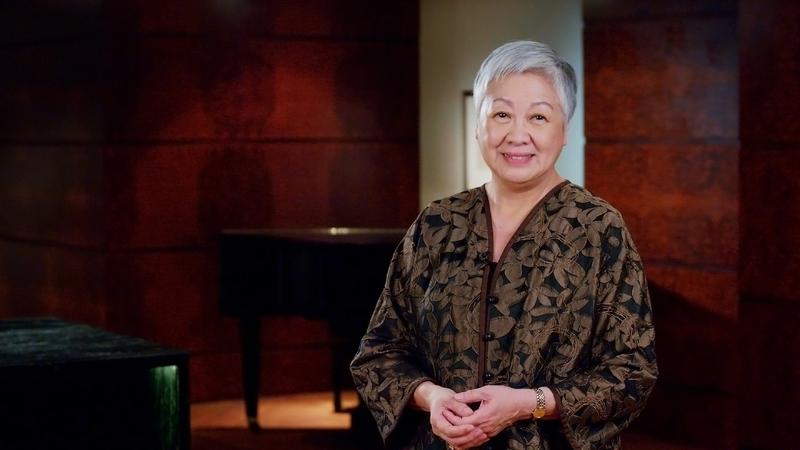 Hong Kong Arts Festival executive director Tisa Ho says the current edition of the festival features both canonical favorites as well as new experimental works. (PHOTO PROVIDED TO CHINA DAILY)
Hong Kong Arts Festival executive director Tisa Ho says the current edition of the festival features both canonical favorites as well as new experimental works. (PHOTO PROVIDED TO CHINA DAILY)
Hong Kong Arts Festival (HKAF) is back with an exciting line-up after a year’s gap, although, unfortunately, several shows originally planned for a live audience had to be transferred online. Would you like to tell us about the challenges of putting together a performance art festival in the time of a pandemic?
We recognize travel is not possible, and this is the reality we have to live with. But together with our international partners, we have managed to put together a program I am very proud of. There are major works in the canon as well as more experimental productions in it and the festival, like in previous years, has a certain weight, depth and scale.
This has not been easy, partly because there is already so much stuff online. Some of our audiences are watching opera and theater every evening. So the challenge is to make sense as a festival in terms of what we present -- try to find meaning, and context.
So we have several clusters: for example, productions from National Theatre Brno, based on works by (the Czech composer) Leoš Janáček, (screen adaptations of) gorgeous ballets by Matthew Bourne, and two different theater adaptations of Albert Camus’ novel, The Plague.
We have tried to keep in mind all that the festival stands for and believes in although the context is completely different. It feels a bit weird but I hope audiences find the program interesting.
It’s lovely to see so many shows commissioned by HKAF and involving local artists in the line-up. The two theatrical adaptations of Camus’ The Plague speak to the current realities, as do some of the dance productions, such as Elephant in the Room and Finding Meaning in an Uncertain World. Were the producers of these shows expected to reflect the crises brought on by the pandemic? Was that part of the brief given to them?
It’s always a conversation, be it under the present circumstances or in previous years. The relevance of a show is always discussed with the concerned artist.
Both the Cantonese and English versions of The Plague are based on Neil Bartlett’s adaptation of Camus’ novel. The conversation around the piece started a couple of years ago. Now the plays have an extra layer of prescience.
Was there a reason behind choosing Hong Kong Chinese Orchestra (HKCO) to stage the festival-opening act which will be livestreamed free on the evening of February 27? Would you like to tell us about the highlights of the show and its adaptations of familiar Chinese cultural themes, such as the existential dream described in Zhuang Zhou’s writing and a piece that alludes to a hit 1980s film called Mahjong Heroes?
HKCO is one of the city’s leading ensembles. They have featured in HKAF over the last 15 years, in a series called Music About China, and it totally made sense to have them open the Festival.
The piece called Mahjong Heroes is very Hong Kong and a lot of fun. We’ve covered a wide landscape of Chinese music in the last 15 years and composers and musicians from outside of China have taken part. The soloist for this concert is the principal cellist, Richard Bamping, from Hong Kong Philharmonic Orchestra, giving us another connection with a major Hong Kong company.
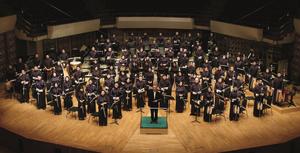 Hong Kong Chinese Orchestra kicks off the 49th edition of Hong Kong Arts Festival on February 27 with Music About China. The show will be livestreamed free. (PHOTO PROVIDED TO CHINA DAILY)
Hong Kong Chinese Orchestra kicks off the 49th edition of Hong Kong Arts Festival on February 27 with Music About China. The show will be livestreamed free. (PHOTO PROVIDED TO CHINA DAILY)
This is the 10th year of HKAF’s collaboration with Hong Kong Jockey Club in developing the Contemporary Dance Series. What would you say is the most significant impact of this collaboration on the Hong Kong dance scene?
Jockey Club has been a fantastic partner since we began this journey together. Our collaboration with them is part of the festival’s desire to add to the cultural ecology of Hong Kong and contemporary dance is one of the fields where we thought we could make an impact. So we tried to create a space to develop new work, give dance-makers administrative back-up and production capacities to support and nurture their creativity. We also put them in touch with musicians, sound designers, lighting and costume professionals to help and support the realization of their artistic vision.
The series has seen a number of cross-border collaborations as well…
It began as (a focus on) Hong Kong talent and then we thought it would be interesting to enlarge (the scope) and aim for stimulation and catalytic impact from outside. So we started cross-border and multi-media (projects). One year we had more experienced artistes mentor younger ones. And then we started splitting the series into full-length works, and shorter works for further development. It’s been a wonderful space for experimentation. A number of these works have been invited to other festivals and selected for international showcases.
What can you tell us about the musical in the making, Yat-sen, based on the early life of the Kuomintang leader Sun Yat-sen – a preview of which will be staged at HKAF 2021? What informed the decision to have a bare-stage preview?
We have been producing new work for 15 years now, and that across genres. We have produced chamber opera, dance, theater and art forms that we weren’t sure how to categorize when we began building on an idea.
Very often we put together a new work in a rush. Sometimes a work we have premiered in Hong Kong matures and settles when it is being toured abroad. This time we thought we’ll give the piece the time it requires to go through that journey before we take it to the premier in the Festival.
The work on Yat-sen is complete but we’ll present it on a bare stage, without lights and décor. I am enormously grateful that we can present it this way first, to give it the opportunity to be reworked if necessary and to mature and settle. .
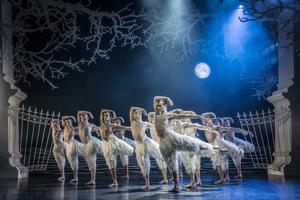 Cinematic adaptations of Matthew Bourne-directed classic ballet pieces, such as Tchaikovsky’s Swan Lake, are a top attraction of the 49th Hong Kong Arts Festival. (PHOTO PROVIDED TO CHINA DAILY)
Cinematic adaptations of Matthew Bourne-directed classic ballet pieces, such as Tchaikovsky’s Swan Lake, are a top attraction of the 49th Hong Kong Arts Festival. (PHOTO PROVIDED TO CHINA DAILY)
Are there any specific challenges involved in hosting an interactive and immersive piece of theater such as Scott Silven’s The Journey in an online format?
It’s a journey of discovery for us operationally, as well as in the narrative structure of the show. Each show will have an audience of 30. Everyone’s online. The audience is on the screen as well and can see each other. They are going to be integrated into the scenography rather than appear on their little Zoom boxes. Scott will be addressing and interacting with the audience individually during the show, although maybe not all of them.
COVID-19 has pushed us to consider the different ways in which we can use technology. For instance, in the English play Plague, we’ll have six artists from different locations in the world performing online in real time. But Scott’s show takes the use of technology to a different level altogether, because of the high-level of interaction and integration.
The No Limits series of shows perhaps get an extra layer of significance, as the pandemic continues to have debilitating impacts on people’s lives around the world. Would you like to tell us about this year’s No Limits shows in the light of the pandemic?
Most of these shows are going to be online and livestreamed free. We also have an artist-in-residence dimension to the No Limits series which addresses the community of differently-abled people.
We began the series two seasons ago, and hope that the artists we’re presenting will appeal to anyone. For instance, Ill-Abilities, an international break dance crew of seven differently-abled dancers we presented in 2020 was amazing. Their mantra is: no excuse, no limits.
This year we have some world class musicians who have overcome challenges of physical conditions. There are also master classes and conversations with them, which I am sure will be inspiring to everyone.
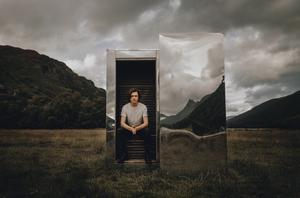 Scott Silven’s immersive cross-disciplinary performance piece, The Journey, will be experienced online. The audience will be integrated into the scenography. (PHOTO PROVIDED TO CHINA DAILY)
Scott Silven’s immersive cross-disciplinary performance piece, The Journey, will be experienced online. The audience will be integrated into the scenography. (PHOTO PROVIDED TO CHINA DAILY)
What is your biggest takeaway from HKAF’s cancelled 2020 edition and downsized 2021 edition that you think is going to be useful in the festival’s milestone 50th edition in 2022?
After we cancelled the 2020 program, there was an outpouring of empathy and support from our international partners as well as those in Hong Kong, which was wonderful. It was heart-warming to find we had so many friends who loved the festival. To this day, some people who bought tickets have not claimed a refund. They say, please just accept it as a donation.
So we received a lot of support and the feeling that we’re in this together.
In fact, the 2021 edition of HKAF is not all that smaller than what we have presented in a regular year. There are two major western operas – Jenůfa and The Cunning Little Vixen by National Theatre Brno – Cantonese operas, Noah’s Ark and Journey to the West Rewind, a chamber opera, Women Like Us, and a children’s opera, Alice in Wonderland by Yip’s Children’s Choir. So there are six operas in all. This would have been quite an achievement in any year.
We might in fact have a bigger audience than previous years because to attend online shows you do not have to be at a specific venue at a specific time. Many online shows are free and the ticket prices for the rest of them are very reasonable.
What are your thoughts on creating sustainable livelihoods for people who make their living from live shows until such time as when the venues reopen and the audiences return?
I think there’ll be some difficult choices to make. I think to keep the work going is very important. Fortunately there is this whole other space online where artistes can still put up their works, although not everyone is equipped to give a concert online.
I think the way that we have worked traditionally won’t go away. When radio and recording were invented, people were worried about concert, but that did not die out. . Those technologies supported live music in many different ways.
I am and want to remain hopeful about the future. We haven’t yet got our heads around all the new possibilities, which is why the work by someone like Scott Silven excites me.
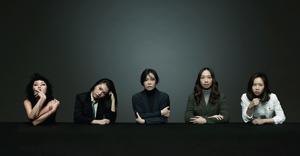 The livestreaming of a Cantonese version of Neil Bartlett’s dramatization of Albert Camus’ novel, The Plague, translated and directed by Chan Tai-yin, is among the festival highlights. (PHOTO PROVIDED TO CHINA DAILY)
The livestreaming of a Cantonese version of Neil Bartlett’s dramatization of Albert Camus’ novel, The Plague, translated and directed by Chan Tai-yin, is among the festival highlights. (PHOTO PROVIDED TO CHINA DAILY)
It’s not just the artistes and creative directors who have no income in the absence of gigs. A whole bunch of support staff gets affected. Is there a way their jobs can be protected?
I don’t think we have worked out what the new business model for performing arts industry is going to be, but I think the creative people have the potential to lead this. In the future, the people who have become a part of performing arts economy will probably be involved in it in different ways.
It’s an evolving scene, and I think the changes were coming anyway, COVID-19 has just accelerated the speed.
Since the pandemic began, several performance art companies around the world have shared recordings of plays and dance performances on free to access internet viewing platforms. Do you think the trend could actually benefit live shows when they are back in theaters?
Online streaming is a great equalizer, especially if you think of places where people don’t get to see performances by major companies of the world, like they do in Hong Kong…
One of the reasons why HKAF succeeds the way it does is because we have a very informed audience in Hong Kong. So they get the best out of the performers who, in turn, know they are playing to a discerning audience. An informed crowd is part of the equation that drives the show in a positive direction. The more high-quality performances are available online for free, the more informed the audience will be. It’s a virtuous cycle.
How hopeful are you about the prospects of monetizing online content?
I think that will happen. In 2020, there was a rush to put content out there. And it was great because people were in lockdown and they could see these works for free.
Many artistes are very generous. They do want to reach out and touch people, with or without getting paid. That’s the Yo-Yo Ma’s of this world, giving free solo recitals through streaming platforms.
But then artistes do need to make a living.
At some point you need to believe that there are more people who want to be helpful and fair, If you give a gift, chances are that the gift will be returned in some way. Many organizations put up a “please donate” sign next to the shows they put online. Others adapt a “pay what you like” model. The habit of buying a ticket to an online show is gradually beginning to form. It’s easy to do and tickets are not that expensive.
As long as someone is producing these shows, and the audience is paying for it, the technicians who work to put the shows together will get a share, and they must — to sustain themselves and the work they produce.
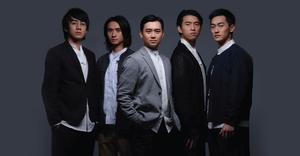 The Hong Kong Arts Festival-commissioned musical, Yat-sen, directed by Eugene Ma, and set to music by Peter Kam, is scheduled for a work-in-progress, bare-stage preview in March. (PHOTO PROVIDED TO CHINA DAILY)
The Hong Kong Arts Festival-commissioned musical, Yat-sen, directed by Eugene Ma, and set to music by Peter Kam, is scheduled for a work-in-progress, bare-stage preview in March. (PHOTO PROVIDED TO CHINA DAILY)
In the light of the Hong Kong government’s pledge to fund Art Tech projects as part of the last Policy Address, are we going to see more tech-heavy shows commissioned by HKAF?
I am very excited by the possible new ways to tell stories and reach audiences. This is one of the reasons we co-commissioned The Journey which I am very pleased about, because the show seemed to be addressing new potentialities in technology and how this could be done in an artistic way.
We are also looking at at least two new projects. One of these is scheduled for HKAF’s 50th anniversary year and has been more than two years in planning.
The government push to develop Art Tech could be an opportunity for artists and creatives to critically examine the interface of art and technology and/or make this a part of their aesthetic. Can you think of shows from earlier or current editions of HKAF that might have already done this and hence could be relied on to repeat the feat in the future?
If you think of the use of technology in theater, the movement in that direction began quite some time ago. And creative people are often curious and willing to embrace new things. I still remember blue light being quite popular in Cantonese Opera at one time. And if you think about it, all theater lighting and scenography use some form of technology. Of course this changes over time and new things are explored: for example, a couple of years ago, we presented Huang Yi and Kuka, in the Asia Pacific Dance Platform, which was a dance production with a robot.
So I think this is very positive, and artists would embrace the potential of technology as long as it relates to what artistes do and the stories they want to tell.
So we’ve been experimenting in pockets like this but we certainly want to do this in a more concerted way.
I think the sound we get traditionally from a violin will continue to remain a source of immense pleasure, beauty and joy. And there will also be scope for using technology to experiment with these sounds.
What I’m interested in is what we do with this new ways of artistes being able to communicate with their audiences, take advantage of what new technologies have to offer and not use it the old way but up the ante on the creativity, the narrative and the powers of expression and communication.
I am also interested in the use of technology in keeping track of the way performing artistes’ bodies change over time.
Is there a possibility of HKAF commissioning online-only shows, as distinct from online adaptations of physical shows – shows that exist and appeal regardless of a pandemic?
Totally. We have been looking at a lot of online shows and trying to understand the lie of the land. Some of these are borrowing elements from the world of gaming and trying to create the physical experience of being in a game.
National Theatre’s The Curious Incident of the Dog in the Night-time, which we brought from London some years ago, is one way of doing it. Another way could be 5G relay which gives viewers the option of customizing the show they are watching.
Then Scott Silven’s The Journey is a rare instance of integrating technology with art in a deeply meaningful way.
If you go
49th Hong Kong Arts Festival
Dates: February 27 to April 4, 2021
Venues: Various Hong Kong venues and online.
Interviewed by Chitralekha Basu


